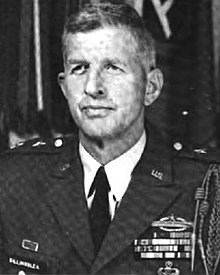Charles Billingslea | |
|---|---|
 MG Charles Billingslea | |
| Nickname(s) | "Chuck" |
| Born | May 16, 1914 Chicago, Illinois, United States |
| Died | March 14, 1989 (aged 74) Washington, D.C., United States |
| Allegiance | |
| Service | |
| Years of service | 1936–1966 |
| Rank | |
| Service number | 0-20367 |
| Unit | |
| Commands | 325th Glider Infantry Regiment 2nd Infantry Division |
| Battles / wars | World War II
|
| Awards | Distinguished Service Cross (2) Army Distinguished Service Medal Bronze Star Medal (2) Army Commendation Medal (2) Order of National Security Merit |
Major General Charles Billingslea (May 16, 1914 – March 14, 1989) was a highly decorated United States Army officer. A graduate of the United States Military Academy (USMA) and a trained parachutist, Billingslea received the Distinguished Service Cross (DSC), the second highest decoration in the United States Armed Forces for heroism in combat, during World War II.[1][2]
Following the war, he remained in the army, eventually reaching general officer's rank and going on to hold several important assignments including command of the 2nd Infantry Division (Indianhead) or Deputy Commanding General, U.S. Army Combat Development Command. He also led the forces that enforced desegregation at the University of Mississippi, during the Ole Miss riot of 1962, and later led forces in Birmingham, Alabama, to maintain the peace during demonstrations led by Martin Luther King Jr. to end segregation.
- ^ "Major General Charles Billingslea | Army Generals | Generals | Museum Exhibits | The Military Memorial Museum". www.militarymemorialmuseum.com. Retrieved 2019-07-28.
- ^ Cite error: The named reference
Valor awards for Charles Billingsleawas invoked but never defined (see the help page).